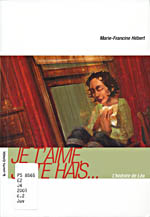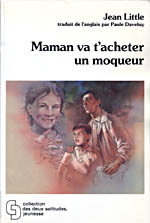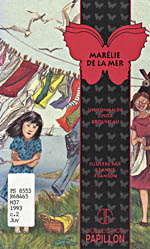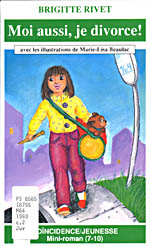|
  
| RUOI Home | Back | Continue with theme (page 5 of 5) |
Noteworthy Books on the Family

French Titles - continued
 Denotes that the book is either a translation or is available in translation. Denotes that the book is either a translation or is available in translation.

 Le Gros problème du petit Marcus
Le Gros problème du petit Marcus
Gilles Gauthier
Illustrations: Pierre-André Derome
Montreal: Éditions de la courte échelle, 1992
62 p. ISBN 2890211789
 Ages 8 to 10. Ages 8 to 10.
Marcus has a big problem that he cannot talk about with anyone.
He never discusses his family, and even Jenny, his best friend,
has never been invited to his house. At school, Marcus agrees to
play the clown in a play in order to impress his father. His
performance is wonderful, but his father doesn't come because he
has drunk too much as usual. Marcus is broken-hearted. A few
days later, Marcus is not at school and the children learn that
he has a broken arm as a result of a car accident caused by his
father, who was impaired at the time. The accident convinces his
father to seek help for his problem.
The illustrations by Pierre-André Derome complement the story
very well.
Courtesy of: Éditions de la Courte Échelle
 Je t'aime, je te hais...
Je t'aime, je te hais...
Marie-Francine Hébert
Montreal: Éditions de la courte échelle, 1991
157 p. ISBN 2890211479
 Ages 12 and up. Ages 12 and up.
Léa Tremble, a teenager, falls in love for the first time with
the handsomest man at school, Bruno Yves. Paradoxically, Émile,
her father, and Suzanne, her mother, who used to seem so close,
have drifted apart. In a household scene which Léa observes,
powerless, her father confesses his infidelity to her mother.
The word divorce is mentioned, and Suzanne rushes out of the
house.
The antagonistic relationship between the father and the daughter
is well depicted. Léa, who as a child had a habit of calling her
father her "big darling Dad" is now faced with a father who has
fallen in her eyes, whose schoolmaster playacting no longer makes
everything right, and who, disappointed with himself, can also
cry.
The parents' break-up leads to instability and a re-examination
of what had been considered permanent and taken for granted. We
experience the uneasiness and incomprehension between Léa and her
father. While the parents' divorce seems inevitable, Léa's
renewed relationship with her father and reconciliation with
Bruno leave the reader on a hopeful note.
Courtesy of: Éditions de la Courte Échelle

 Maman va t'acheter un moqueur
Maman va t'acheter un moqueur
Jean Little
Translation: Paule Daveluy
Montreal: Éditions Pierre Tisseyre, 1986
260 p. ISBN 2890513092
 Ages 10 to 14. Ages 10 to 14.
The theme of this very beautiful book is the acceptance of the
death of a loved one, and the effect of the loss on a very warm
and closely knit family. Jérémie Talbot, who is 12 years old,
spends the summer with his sister at the family cottage, where
they are joined by their parents. He is deeply shaken when he
discovers that his father, Adrien, who has recently been released
from the hospital, is dying of cancer. The family tries bravely
to face this overwhelming situation, and the time they spend
together becomes much more precious. After Adrien's death, the
members of the family begin to put their lives back together.
The translation is excellent.
Courtesy of: Éditions Pierre Tisseyre 1986
 Marélie de la mer
Marélie de la mer
Linda Brousseau
Saint-Laurent, Quebec: Éditions Pierre Tisseyre, 1993
90 p. ISBN 2890515109
 Ages 9 and up. Ages 9 and up.
Marélie is an orphan and moves from one foster family to another.
She yearns to have a mother of her own like all the other
children. As a way of satisfying this need, Marélie invents a
different mother for herself every night. One day, in a new home
on the other side of the world, her real mother comes into her
life. This marks the beginning of a troubling and emotional time
for Marélie.
Courtesy of: Éditions Pierre Tisseyre 1993
 Moi aussi, je divorce
Moi aussi, je divorce
Brigitte Rivet
Illustrations: Marie-Lisa Beaulac
Iberville, Quebec: Coïncidence/Jeunesse, 1991
55 p. ISBN 2890524264
 Ages 7 to 10. Ages 7 to 10.
Frédérique has to choose between Mom and Dad. It isn't easy,
especially since they are fighting for custody of their only
daughter! She comes up with the solution to "their" problem: she
won't go with either one.
Frédérique tells us the story of how she leaves and goes to stay
with her great-aunt Gertrude, who has a strange illness and does
some very odd things.
Courtesy of: Coïncidence/Jeunesse
|